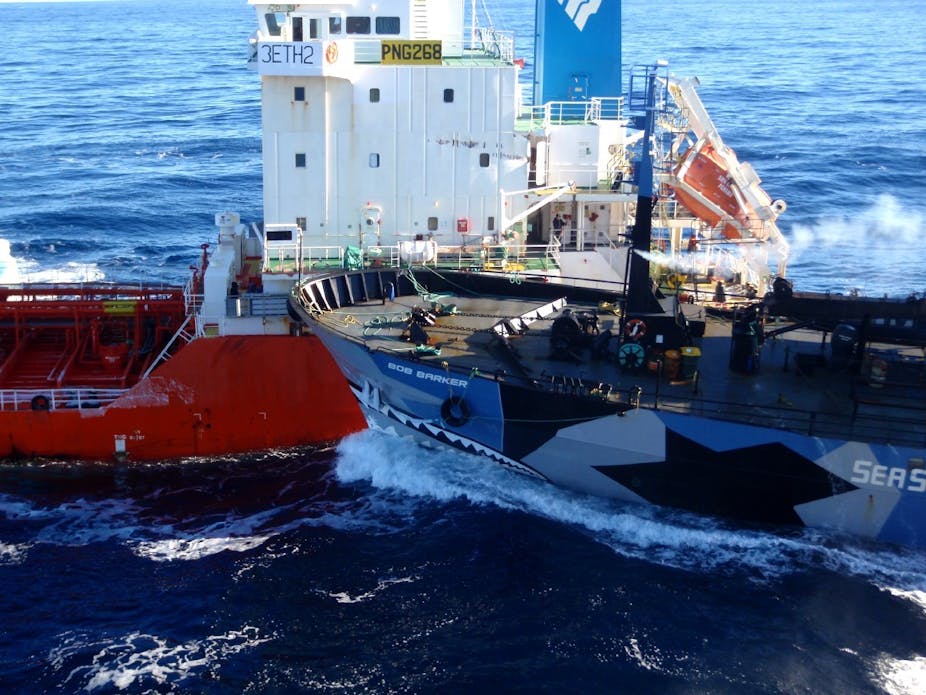The US ninth circuit Court of Appeal has decided today that Sea Shepherd activists are pirates.
The decision begins with colourful rhetoric about the appearance of pirates throughout fiction, but it addresses the question of definition that still plagues international lawyers: what constitutes piracy?
The offence of piracy is defined in the United Nations Law of the Sea Convention (UNCLOS), by way of the International Law Commission’s draft treaty on the Law of the Sea in 1956. In the context of Somali piracy, there is no dispute as to whether the actions of the people involved constitute piracy. But the actions of Sea Shepherd are less clear.
The accusation of piracy hinged on article 101 1(a) of UNCLOS which defines piracy as: “any illegal acts of violence or detention, or any act of depredation, committed for private ends by the crew or the passengers of a private ship or a private aircraft” on either the high seas or beyond the jurisdiction of any nation.
I think that there is little question that the actions of Sea Shepherd fit within the broad definition of violence, but as to whether or not they fulfil the requirements of violence being done for private ends is open to debate.
Chief Judge Kozinski adopted the broad approach of defining private in the context of international law, namely that any act not taken on behalf of a public authority (for example a government) constitutes a private act. This interpretation has supported by numerous international lawyers, but it is not the only interpretation of this phrase.
Numerous lawyers have argued that in the context of piracy, the phrase “private ends” simply refers to financial gain. Indeed, this was the interpretation from the court which this matter was on appeal from. While such an argument is not without merit in light of history, it is questionable when the debates around the definitions of what constituted piracy in the International Law Commission are considered.
These debates suggest that the phrase “private ends” most certainly goes beyond mere financial gain, including acts of vengeance or hatred, but falls short of acts conducted for political or religious reasons. The failure to include acts committed for a political or religious purpose in the crime of piracy was a bone of contention in the debates.
On two separate occasions concerns were raised in these debates about the fact that politically motivated violence on the high seas would not constitute piracy. On both occasions the concerns were dismissed with the commentary on the draft articles stating: “Acts of piracy may be prompted by feelings of hatred or revenge, and not merely the desire for gain”.
One need only look at Sea Shepherd’s website to see that their actions are motivated by environmental activism, even Chief Judge Kozinski recognised this in his judgement. So while the actions of Sea Shepherd most certainly constitute violence there is a question as to whether or not that violence is being committed for private ends. The answer is not so clear-cut and has consequences beyond the actions of Sea Shepherd. Should the majority decision in this case be taken as the correct interpretation of “private ends” then all acts of politically motivated terrorism occurring on international waters can be rightly defined as piracy. The debate on this is far from over but the consequences should be considered as it continues.
Are the actions of Sea Shepherd violent? Yes, there is very little doubt about whether or not Sea Shepherd are engaging in violence.
Are the actions of Sea Shepherd illegal? Most certainly, regardless of how the phrase “private ends” is interpreted, the acts of Sea Shepherd are in violation of article three of the Convention for the Suppression of Unlawful Acts Against the Safety of Maritime Navigation.
Are Sea Shepherd pirates? In my opinion, probably not.

